The AMD 3rd Gen Ryzen Deep Dive Review: 3700X and 3900X Raising The Bar
by Andrei Frumusanu & Gavin Bonshor on July 7, 2019 9:00 AM EST** = Old results marked were performed with the original BIOS & boost behaviour as published on 7/7.
Benchmarking Performance: CPU Legacy Tests
3DPM v1: Naïve Code Variant of 3DPM v2.1
The first legacy test in the suite is the first version of our 3DPM benchmark. This is the ultimate naïve version of the code, as if it was written by scientist with no knowledge of how computer hardware, compilers, or optimization works (which in fact, it was at the start). This represents a large body of scientific simulation out in the wild, where getting the answer is more important than it being fast (getting a result in 4 days is acceptable if it’s correct, rather than sending someone away for a year to learn to code and getting the result in 5 minutes).
In this version, the only real optimization was in the compiler flags (-O2, -fp:fast), compiling it in release mode, and enabling OpenMP in the main compute loops. The loops were not configured for function size, and one of the key slowdowns is false sharing in the cache. It also has long dependency chains based on the random number generation, which leads to relatively poor performance on specific compute microarchitectures.
3DPM v1 can be downloaded with our 3DPM v2 code here: 3DPMv2.1.rar (13.0 MB)
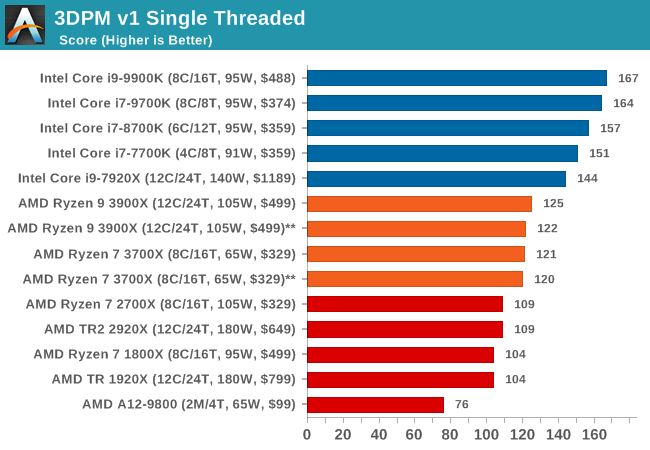
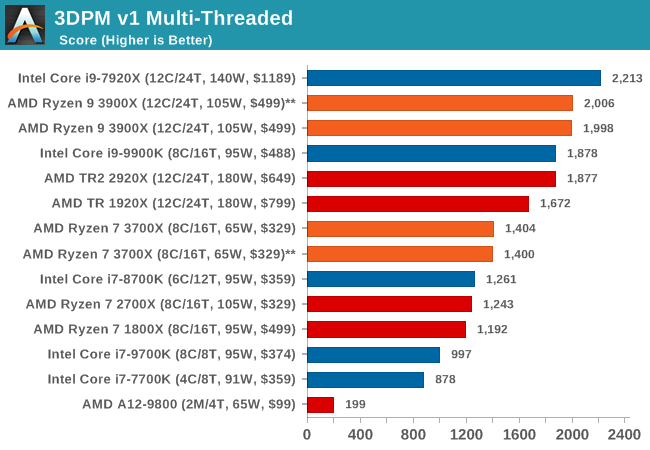
x264 HD 3.0: Older Transcode Test
This transcoding test is super old, and was used by Anand back in the day of Pentium 4 and Athlon II processors. Here a standardized 720p video is transcoded with a two-pass conversion, with the benchmark showing the frames-per-second of each pass. This benchmark is single-threaded, and between some micro-architectures we seem to actually hit an instructions-per-clock wall.
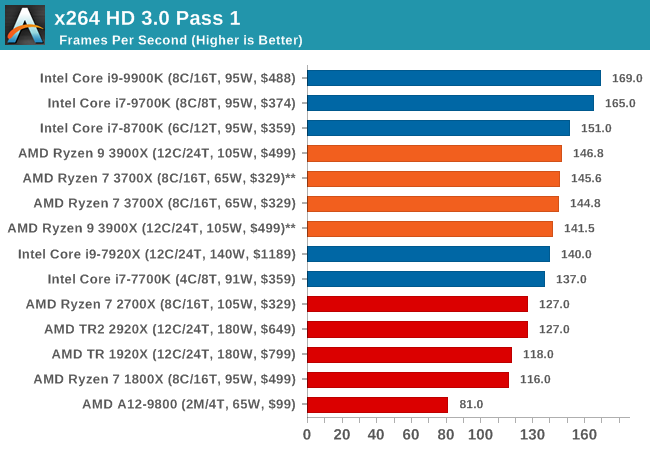
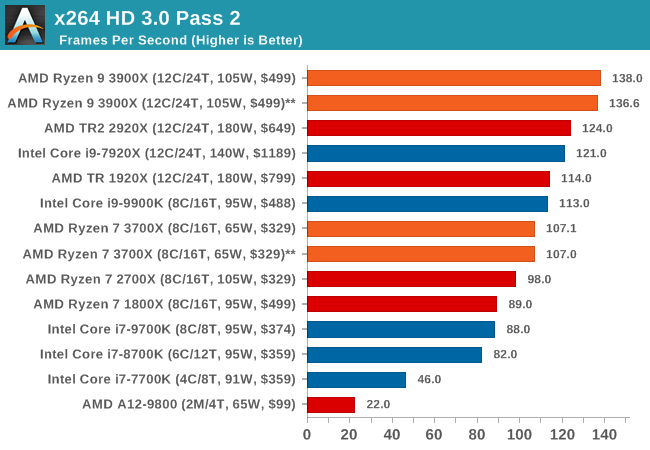
CineBench 11.5 and 10
Cinebench is a widely known benchmarking tool for measuring performance relative to MAXON's animation software Cinema 4D. Cinebench has been optimized over a decade and focuses on purely CPU horsepower, meaning if there is a discrepancy in pure throughput characteristics, Cinebench is likely to show that discrepancy. Arguably other software doesn't make use of all the tools available, so the real world relevance might purely be academic, but given our large database of data for Cinebench it seems difficult to ignore a small five minute test. We run the modern version 15 in this test, as well as the older 11.5 due to our back data.
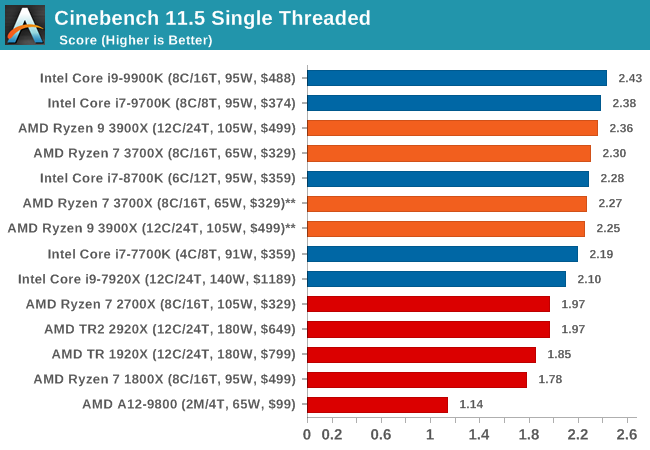
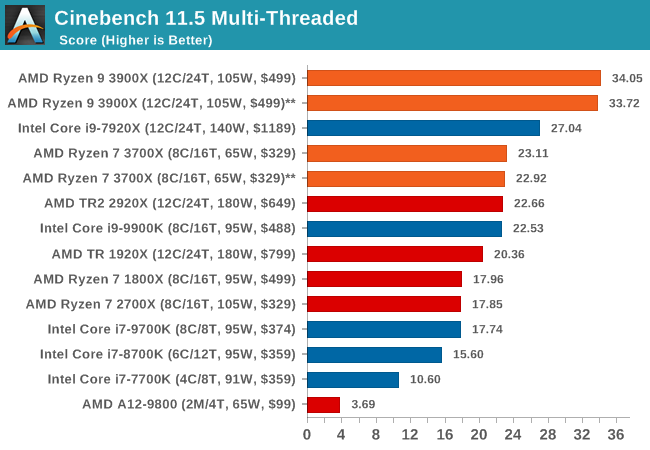










447 Comments
View All Comments
Korguz - Monday, July 22, 2019 - link
Maxiking, and HOW LONG till intel gets the SAME treatment?? saying a processor uses x watts, but in reality uses 50 to 100 watts MORE isnt FRAUD ??? hell you confine intels cpus to the watts they state, and their performance goes DOWN THE TOILET !!!. again .. you KEEP saying AMD is a fraud, but you STILL refuse to admit, that intel is a fraud as well..does this guy even acknowlege the issue with intel and the amount of power they " say " their cpus use, and how much power they REALLY use ??
Korguz - Monday, July 22, 2019 - link
further.. intel doesnt do any marketing, cause they DON'T want the general average user to know the cpu they bought, uses MORE power then has been stated, THAT also is false advertising, come on maxiking, go after intel as well, the same same things you are accusing amd of...Maxiking - Tuesday, July 23, 2019 - link
You are uneducated, TDP doesn't mean power consumption but the amount of heat dissipated, it informs you how much of heat the cooler must be able to dissipate in order to keep the cpu cool enough to run.Get it? 1700x TDP was 95W yet there were tasks it managed to consume 120 or even 140w on stock settings. Like do you even watch reviews? It was the same with 2700w.
but mimimimimimi AMD good mimimimimi Intel bad
Korguz - Tuesday, July 23, 2019 - link
sorry dude.. but YOU are uneducated, amd stays A LOT closer to its stated TDP then intel does, AT even did a review on it. power dissipated, also relates to power used. but it also doesnt help, that amd and intel both use the term TDP differently. either way.. intel uses more power then amd does.https://www.anandtech.com/show/13544/why-intel-pro...
Maxiking - Tuesday, July 23, 2019 - link
Again, TDP is not power consumption and it refers to a cooler.You are uneducated and fabricating because you are an amd fanboy. No one really cares about what is more accurate or not, because it does not say anything about power consumption of the chip.
So keep living in your nice little bubble. It is not my fault that you and other sites have been thinking that TDP -> power consumption. I will share something new to you again.. Ever heard about that Frankenstein novel? Frankenstein in not the monster but the doctor, his surname..Shocking I KNOW!!!
mimimimimimi AMD good mimimimimi Intel bad
Korguz - Tuesday, July 23, 2019 - link
again.. TDP, or Thermal Design Power, does relate to power consumption and how much is needed to keep something cool. You are uneducated and fabricating because you are an intel fanboy. i also notice you like to throw personal insults around when someone disagrees with you, or to try to make your opinion valid. so you keep living in your nice little bubble as well, not my fault you dont understand TDP relates to how much power something uses, as the more power a product uses, the more heat it creates, and then, needs to be removed.mimimimimimi intel good mimimimimi amd bad
Maxiking - Thursday, July 25, 2019 - link
What you just did it is just sad. it shows you are little kid.TDP is not power consumption, if TDP - 100% power consumption, it would mean that 100% of the electrical energy is converted into thermal energy so yeah which is impossible it would mean perpetuum mobile you twat, actually the cpu would be net positive, it would convert 100% of electrical energy into thermal whilst managing to perform another task at no energy cost.
Breaking the laws of physics just because of your AMD fanboyism
Korguz - Thursday, July 25, 2019 - link
i said it RELATES to power consumption, what, you cant read ?? cant see passed your intel bias ?? the more power something uses, the more heat it generates, and there for, the more needs to be dissipated, and i also never said anything about 100% power consumption, pulling words and making things up to try to make your self sound right ? And you are calling me names on top of that, who's the kid here ???Maxiking - Tuesday, July 23, 2019 - link
You are uneducated, TDP doesn't mean power consumption but the amount of heat dissipated, it informs you how much of heat the cooler must be able to dissipate in order to keep the cpu cool enough to run.Get it? 1700x TDP was 95W yet there were tasks it managed to consume 120 or even 140w on stock settings. Like do you even watch reviews? It was the same with 2700w.
but mimimimimimi AMD good mimimimimi Intel bad
Qasar - Tuesday, July 23, 2019 - link
hmmm doest really say amd is being fraudulent, just doesnt like the idea the chips might not boost, or run at what AMD says, but didnt mention fraud...and Korguz has a point.. WHY arent you commenting about the power intels cpus use, vs what intel says they use ?